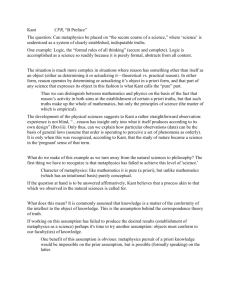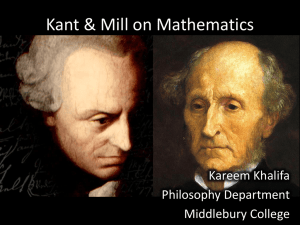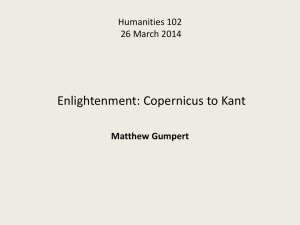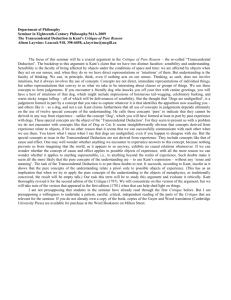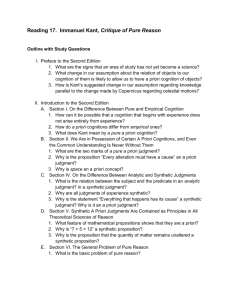Kant’s Concepts of Mathematics
advertisement
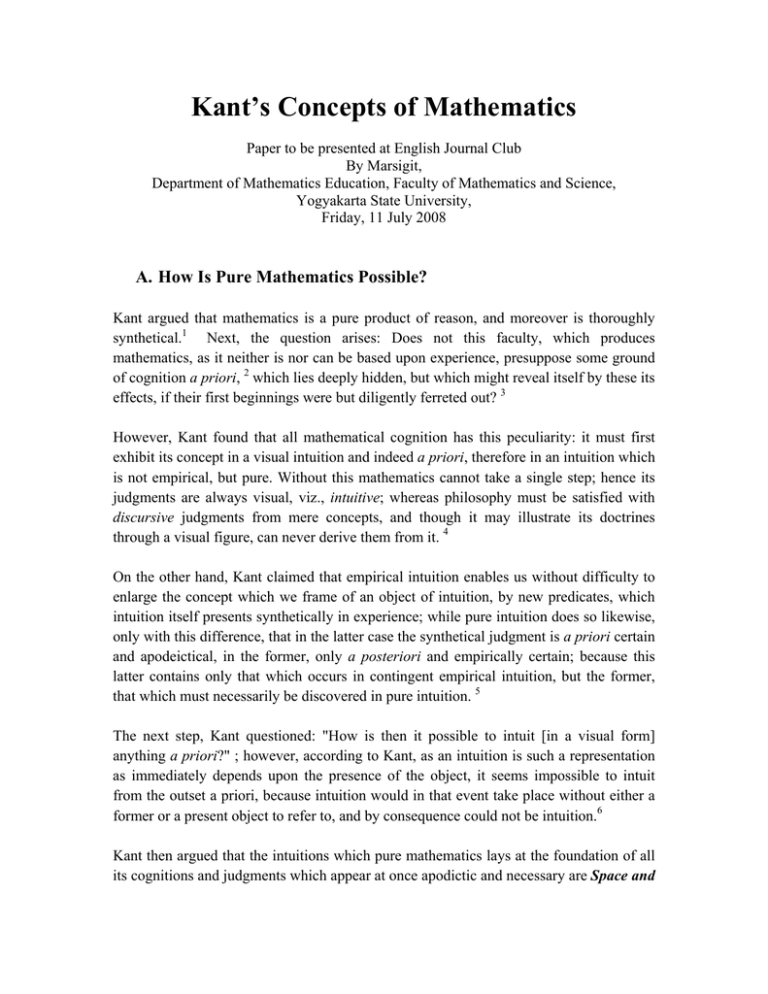
Kant’s Concepts of Mathematics Paper to be presented at English Journal Club By Marsigit, Department of Mathematics Education, Faculty of Mathematics and Science, Yogyakarta State University, Friday, 11 July 2008 A. How Is Pure Mathematics Possible? Kant argued that mathematics is a pure product of reason, and moreover is thoroughly synthetical.1 Next, the question arises: Does not this faculty, which produces mathematics, as it neither is nor can be based upon experience, presuppose some ground of cognition a priori, 2 which lies deeply hidden, but which might reveal itself by these its effects, if their first beginnings were but diligently ferreted out? 3 However, Kant found that all mathematical cognition has this peculiarity: it must first exhibit its concept in a visual intuition and indeed a priori, therefore in an intuition which is not empirical, but pure. Without this mathematics cannot take a single step; hence its judgments are always visual, viz., intuitive; whereas philosophy must be satisfied with discursive judgments from mere concepts, and though it may illustrate its doctrines through a visual figure, can never derive them from it. 4 On the other hand, Kant claimed that empirical intuition enables us without difficulty to enlarge the concept which we frame of an object of intuition, by new predicates, which intuition itself presents synthetically in experience; while pure intuition does so likewise, only with this difference, that in the latter case the synthetical judgment is a priori certain and apodeictical, in the former, only a posteriori and empirically certain; because this latter contains only that which occurs in contingent empirical intuition, but the former, that which must necessarily be discovered in pure intuition. 5 The next step, Kant questioned: "How is then it possible to intuit [in a visual form] anything a priori?" ; however, according to Kant, as an intuition is such a representation as immediately depends upon the presence of the object, it seems impossible to intuit from the outset a priori, because intuition would in that event take place without either a former or a present object to refer to, and by consequence could not be intuition.6 Kant then argued that the intuitions which pure mathematics lays at the foundation of all its cognitions and judgments which appear at once apodictic and necessary are Space and Time. 7 Accordingly, because mathematics must first have all its concepts in intuition, and pure mathematics in pure intuition, hence, mathematics must construct them. 8 Geometry is based upon the pure intuition of space; and, arithmetic accomplishes its concept of number by the successive addition of units in time; and pure mechanics especially cannot attain its concepts of motion without employing the representation of time. Kant stressed that both representations, however, are only intuitions; for if we omit from the empirical intuitions of bodies and their alterations (motion) everything empirical, or belonging to sensation, space and time still remain, which are therefore pure intuitions that lie a priori at the basis of the empirical. 9 Therefore, Kant concluded that pure mathematics, as synthetical cognition a priori, is only possible by referring to no other objects than those of the senses, in which, at the basis of their empirical intuition lies a pure intuition (of space and of time) which is a priori. Kant claimed that this is possible, because the latter intuition is nothing but the mere form of sensibility, which precedes the actual appearance of the objects, in that it, in fact, makes them possible; and yet this faculty of intuiting a priori affects not the matter of the phenomenon 10 Kant illustrated that in ordinary and necessary procedure of geometers, all proofs of the complete congruence of two given figures come ultimately to this that they may be made to coincide; which is evidently nothing else than a synthetical proposition resting upon immediate intuition, and this intuition must be pure, or given a priori, otherwise the proposition could not rank as apodictically certain, but would have empirical certainty only. 11 Kant further claimed that everywhere space has three dimensions, and that space cannot in any way have more, is based on the proposition that not more than three lines can intersect at right angles in one point. Kant argued that drawing the line to infinity and representing the series of changes e.g. spaces travers by motion can only attach to intuition, then he concluded that the basis of mathematics actually are pure intuitions; while the transcendental deduction of the notions of space and of time explains, at the same time, the possibility of pure mathematics. 12 In the Remark I, Kant elaborated that pure mathematics, and especially pure geometry, can only have objective reality on condition that they refer to objects of sense. But in regard to the latter the principle holds good, that our sense representation is not a representation of things in themselves but of the way in which they appear to us. Hence it follows, that the propositions of geometry are not the results of a mere creation of our poetic imagination, and that therefore they cannot be referred with assurance to actual objects; but rather that they are necessarily valid of space, and consequently of all that may be found in space, because space is nothing else than the form of all external appearances, and it is this form alone in which objects of sense can be given. (Immanuel Kant Prolegomena To Any Future Metaphysics , First Part Of The Transcendental Problem: How Is Pure Mathematics Possible? Remark 1, 287) Sensibility, the form of which is the basis of geometry, is that upon which the possibility of external appearance depends. Therefore these appearances can never contain anything but what geometry prescribes to them. The space of the geometer would be considered a mere fiction, and it would not be credited with objective validity, because we cannot see how things must of necessity agree with an image of them, which we make spontaneously and previous to our acquaintance with them. 13 But if this image, or rather this formal intuition, is the essential property of our sensibility, by means of which alone objects are given to us, and if this sensibility represents not things in themselves, but their appearances: we shall easily comprehend, and at the same time indisputably prove, that all external objects of our world of sense must necessarily coincide in the most rigorous way with the propositions of geometry; because sensibility by means of its form of external intuition, viz., by space, the same with which the geometer is occupied, makes those objects at all possible as mere appearances. 14 Because the space of the geometer is exactly the form of sensuous intuition which we find a priori in us, and contains the ground of the possibility of all external appearances (according to their form), and the latter must necessarily and most rigidly agree with the propositions of the geometer, which he draws not from any fictitious concept, but from the subjective basis of all external phenomena, which is sensibility itself. 15 B. Mathematical Judgment Because it would be absurd to base an analytical judgment on experience, as our concept suffices for the purpose without requiring any testimony from experience, Kant concluded that Empirical judgments are always synthetical, e.g. “That body is extended” is a judgment established a priori, and not an empirical judgment. And also, for before appealing to experience, we already have all the conditions of the judgment in the concept, from which we have but to elicit the predicate according to the law of contradiction, and thereby to become conscious of the necessity of the judgment, Kant concluded that which experience could not even teach us.16 According to Kant, Mathematical judgments are all synthetical and he argued that this fact seems hitherto to have altogether escaped the observation of those who have analyzed human reason; it even seems directly opposed to all their conjectures, though incontestably certain, and most important in its consequences. Further he claimed that for as it was found that the conclusions of mathematicians all proceed according to the law of contradiction (as is demanded by all apodictic certainty), men persuaded themselves that the fundamental principles were known from the same law. “This was a great mistake”, he said. He then delivered the reason that for a synthetical proposition can indeed be comprehended according to the law of contradiction, but only by presupposing another synthetical proposition from which it follows, but never in itself.17 To support this argument, Kant started to examined the case of addition 7 + 5 = 12. According to him, it might at first be thought that the proposition 7 + 5 = 12 is a mere analytical judgment, following from the concept of the sum of seven and five, according to the law of contradiction. However, accordingly, if we closely examine the operation, it appears that the concept of the sum of 7+5 contains merely their union in a single number, without its being at all thought what the particular number is that unites them. Therefore, he concluded that the concept of twelve is by no means thought by merely thinking of the combination of seven and five; and analyze this possible sum as we may, we shall not discover twelve in the concept. Kant suggested that first of all, we must observe that all proper mathematical judgments are a priori, and not empirical. According to him, mathematical judgments carry with them necessity, which cannot be obtained from experience, therefore, it implies that it contains pure a priori and not empirical cognitions.18 We, then, must go beyond these concepts, by calling to our aid some concrete image [Anschauung], i.e., either our five fingers, or five points (as Segner has it in his Arithmetic), and we must add successively the units of the five, given in some concrete image [Anschauung], to the concept of seven; hence our concept is really amplified by the proposition 7 + 5 = I 2, and we add to the first a second, not thought in it. Ultimately, Kant concluded that arithmetical judgments are therefore synthetical, and the more plainly according as we take larger numbers; for in such cases it is clear that, however closely we analyze our concepts without calling visual images (Anscliauung) to our aid, we can never find the sum by such mere dissection. 19 Similarly, Kant argued that all principles of geometry are no less analytical. He illustrated that the proposition “a straight line is the shortest path between two points”, is a synthetical proposition because the concept of straight contains nothing of quantity, but only a quality. He claimed that the attribute of shortness is therefore altogether additional, and cannot be obtained by any analysis of the concept; and its visualization [Anschauung] must come to aid us; and therefore, it alone makes the synthesis possible. 20 Kant confronted the previous geometers assumption which claimed that other mathematical principles are indeed actually analytical and depend on the law of contradiction. However, he strived to show that in the case of identical propositions, as a method of concatenation, and not as principles, e. g., a=a, the whole is equal to itself, or a + b > a, the whole is greater than its part. He then claimed that although they are recognized as valid from mere concepts, they are only admitted in mathematics, because they can be represented in some visual form [Anschauung].21 Notes 1. A synthetic proposition is a proposition that is capable of being true or untrue based on facts about the world - in contrast to an analytic proposition which is true by definition. (From Wikipedia, the free encyclopedia) 2. A priori knowledge is propositional knowledge that can be had without experience. It is usually contrasted with a posteriori knowledge, which requires experience. Mathematics and logic are usually considered a priori disciplines. The natural and social sciences are usually considered a posteriori disciplines (From Wikipedia, the free encyclopedia) 3. Immanuel Kant, Prolegomena to Any Future Metaphysics , First Part Of The Transcendental Problem: How Is Pure Mathematics Possible?) Sect. 6. 4. This observation on the nature of mathematics gives us a clue to the first and highest condition of its possibility, which is, that some pure intuition [reine Anschauung] must form its basis, in which all its concepts can be exhibited or constructed, in concreto and yet a priori. If we can locate this pure intuition and its possibility, we may thence easily explain how synthetical propositions a priori are possible in pure mathematics, and consequently how this science itself is possible. (Immanuel Kant Prolegomena to Any Future Metaphysics , First Part Of The Transcendental Problem: How Is Pure Mathematics Possible?) Sec.7. para. 281 5. Pure intuition [viz., the visualization of forms in our imagination, from which every thing sensual, i.e., every thought of material qualities, is excluded]. Here intuition, being an intuition a priori, is before all experience, viz., before any perception of particular objects, inseparably conjoined with its concept. (Immanuel Kant Prolegomena to Any Future Metaphysics , First Part Of The Transcendental Problem: How Is Pure Mathematics Possible?) Sect. 7. para. 281 6. Hence it follows: that propositions, which concern this form of sensuous intuition only, are possible and valid for objects of the senses; as also, conversely, that intuitions which are possible a priori can never concern any other things than objects of our senses. (Immanuel Kant Prolegomena to Any Future Metaphysics , First Part Of The Transcendental Problem: How Is Pure Mathematics Possible?) sec.9 para. 282 7. Space is the form of the external intuition of this sensibility, and the internal determination of every space is only possible by the determination of its external relation to the whole space, of which it is a part (in other words, by its relation to the external sense). 8. If it proceeded in any other way, it would be impossible to make any headway, for mathematics proceeds, not analytically by dissection of concepts, but synthetically, and if pure intuition be wanting, there is nothing in which the matter for synthetical judgments a priori can be given. Immanuel Kant Prolegomena to Any Future Metaphysics , First Part Of The Transcendental Problem: How Is Pure Mathematics Possible? Sect.10 para. 283 9. Hence they can never be omitted, but at the same time, by their being pure intuitions a priori, they prove that they are mere forms of our sensibility, which must precede all empirical intuition, or perception of actual objects, and conformably to which objects can be known a priori, but only as they appear to us. (Immanuel Kant Prolegomena to Any Future Metaphysics , First Part Of The Transcendental Problem: How Is Pure Mathematics Possible?) Sec.10 para. 283. 10. Phenomenon is the sense-element in it, for this constitutes that which is empirical), but its form, viz., space and time. (Immanuel Kant Prolegomena to Any Future Metaphysics , First Part Of The Transcendental Problem: How Is Pure Mathematics Possible?) Sect.11 para 284 11. In that case, it could only be said that it is always found to be so, and holds good only as far as our perception reaches. (Immanuel Kant Prolegomena to Any Future Metaphysics , First Part Of The Transcendental Problem: How Is Pure Mathematics Possible?) Sect. 12 para 285 12. Without some such deduction its truth may be granted, but its existence could by no means be understood, and we must assume "that everything which can be given to our senses (to the external senses in space, to the internal one in time) is intuited by us as it appears to us, not as it is in itself." (Immanuel Kant Prolegomena to Any Future Metaphysics , First Part Of The Transcendental Problem: How Is Pure Mathematics Possible?) Sect.12 para. 285 13. It would be quite otherwise if the senses were so constituted as to represent objects as they are in themselves. (Immanuel Kant Prolegomena to Any Future Metaphysics , First Part Of The Transcendental Problem: How Is Pure Mathematics Possible?) Remark I, para 287 14. Immanuel Kant Prolegomena to Any Future Metaphysics , First Part Of The Transcendental Problem: How Is Pure Mathematics Possible?) Remark 1 , para. 287 15. In this and no other way can geometry be made secure as to the undoubted objective reality of its propositions against all the intrigues of a shallow Metaphysics, which is surprised at them [the geometrical propositions], because it has not traced them to the sources of their concepts. (Immanuel Kant Prolegomena To Any Future Metaphysics , First Part Of The Transcendental Problem: How Is Pure Mathematics Possible?) Remark I, para. 288 16. Existence and Reality(Kant e-text reading I) Texts For Discussion Page: Prolegomena to Any Future Metaphysics Preamble, Section 2): Kant's argument in support of his view that all properly mathematical judgments are synthetic a priori judgments ) 17. Kant suggested that first of all, we must observe that all proper mathematical judgments are a priori, and not empirical. According to him, mathematical judgments carry with them necessity, which cannot be obtained from experience, therefore, it implies that it contains pure a priori and not empirical cognitions. (Existence and Reality(Kant e-text reading I) Texts For Discussion Page: Prolegomena to Any Future Metaphysics Preamble, Section 2): Kant's argument in support of his view that all properly mathematical judgments are synthetic a priori judgments ) 18. Existence and Reality(Kant e-text reading I: Texts For Discussion Page: Prolegomena to Any Future Metaphysics Preamble, Section 2: Kant's argument in support of his view that all properly mathematical judgments are synthetic a priori judgments ) 19. ibid. 20. ibid. 21. What usually makes us believe that the predicate of such apodictic judgments is already contained in our concept, and that the judgment is therefore analytical, is the duplicity of the expression, requesting us to think a certain predicate as of necessity implied in the thought of a given concept, which necessity attaches to the concept. But the question is not what we are requested to join in thought to the given concept, but what we actually think together with and in it, though obscurely; and so it appears that the predicate belongs to these concepts necessarily indeed, yet not directly but indirectly by an added visualization [Anschauung]. (Existence and Reality(Kant e-text reading I) Texts For Discussion Page: Prolegomena to Any Future Metaphysics Preamble, Section 2): Kant's argument in support of his view that all properly mathematical judgments are synthetic a priori judgments )
